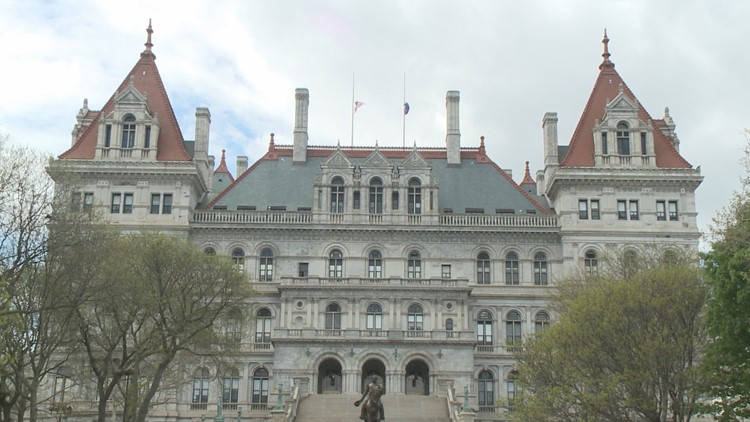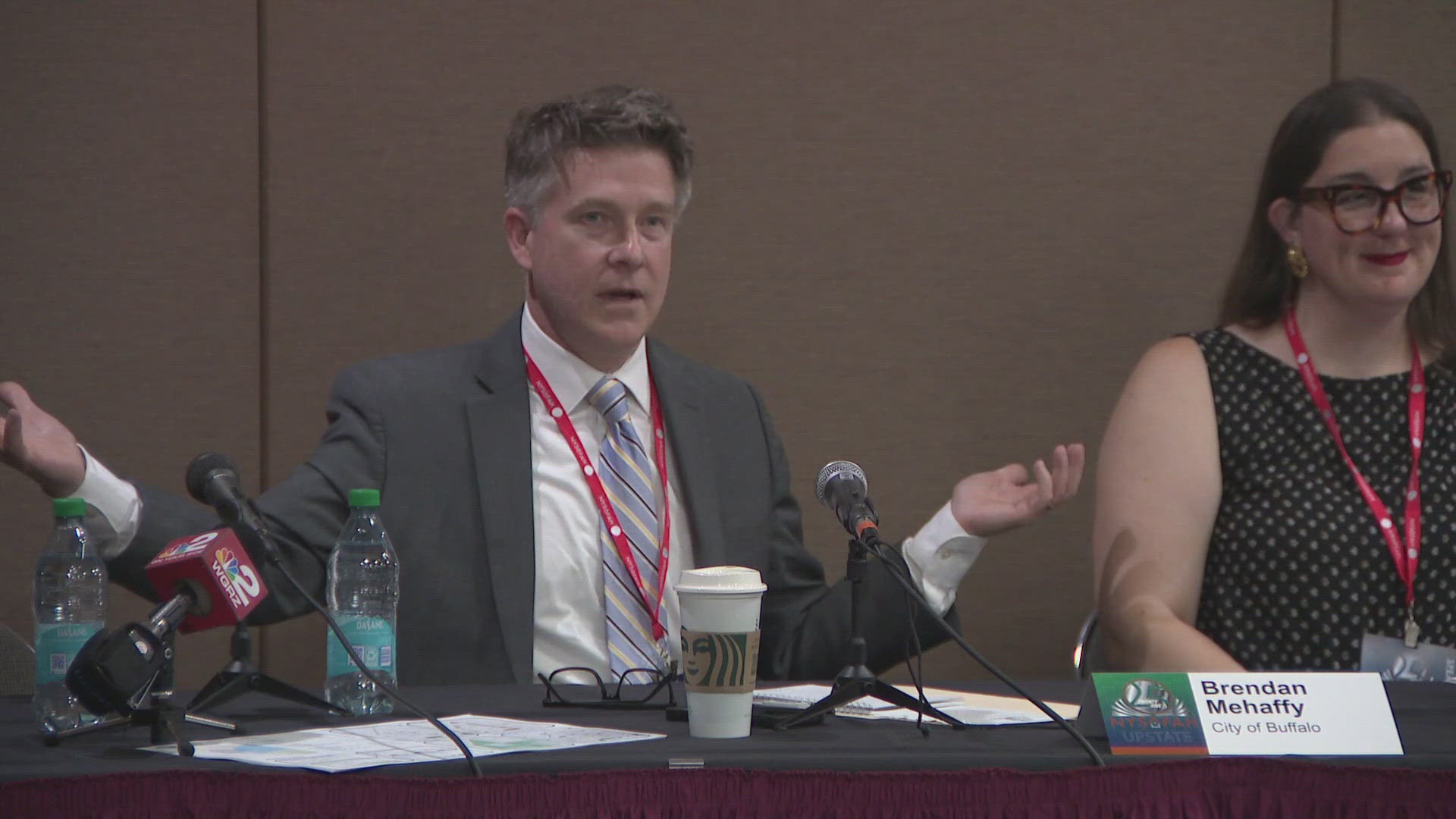ALBANY, N.Y. — New Yorkers can expect more fireworks as political appointees finish writing laws for a $100 million system to let political candidates run with public funds.
Critics argue the nine-member Public Campaign Financing Commission is the latest example of lawmakers and the governor failing to pass laws themselves and unconstitutionally shoving off responsibility to a state commission that lacks expertise, staffing and a budget for legal battles.
Lawmakers budgeted $100 million for a system that would match candidates' fundraising with taxpayer money in hopes of reducing the role of deep-pocketed donors and corporations that have long held sway in Albany. The commission has until Dec. 1 to release its proposal, which becomes law unless lawmakers return to Albany to overturn it.
WHAT WILL THE COMMISSION’S REPORT SAY?
The commissioners seem to agree on some big issues, including how much candidates must raise to qualify for public matching funds and from how many donors. But they could always change their minds, so what their final report will say is unclear.
This week, commissioners voted for limits of $5,000 per donor for Assembly races and $10,000 for Senate races, down from roughly $9,000 and $19,000. Some commissioners warned against setting the limits any lower, saying that would hurt candidates opposed by independent groups who can spend vast sums.
But Reinvent Albany senior policy adviser Alex Camarda said the proposed limits are still much too high to combat corruption. Federal presidential candidates, for example can raise $5,600 from a single donor.
“They still permit candidates to rely heavily on big money, in particular incumbents, which is one of the main problems with campaign finance in New York State,” he said.
Advocates want to limit public matching funds to money from small donors, prevent candidates from rolling over war chests from previous elections and allow candidates to seek out-of-district matching contributions.
WHAT ELSE COULD THE COMMISSION DO?
The commission may also make it tougher for minor parties like the Independence, Conservative and Working Families parties to get on the ballot in a general election.
Right now, a small party can get a ballot line if their candidates got 50,000 votes in the last election. New York State Democratic Party Chairman Jay Jacobs, a commissioner, has proposed raising that requirement to 250,000 votes. That’s a level few small parties now reach.
Supporters worry the commission could weaken third parties in other ways. For example, Jacobs opposes fusion voting, where major party candidates can have their names appear in several places on a ballot if they get endorsed by a minor party.
IS CUOMO INFLUENCING THE COMMISSION?
Cuomo lost the endorsement of the liberal Working Families Party to the actress and activist Cynthia Nixon in his last reelection campaign. Now, critics claims Cuomo operatives want to punish the party.
Jacobs, one of two commission members appointed by Cuomo, has denied suggestions that his proposals are linked to the governor’s own political fights and claimed some parties including the Women’s Equality Party — which Cuomo created — are “shams.” Cuomo has publicly scoffed at suggestions that he’s targeting the Working Families Party and claims that cutting down on parties on the ballot would reduce costs for public campaign financing.
“It’s very easy to be a candidate,” said Cuomo’s adviser Richard Azzopardi.
WHAT OTHER ISSUES ARE COMMISSIONS TACKLING?
In recent years, New York lawmakers and Democratic Gov. Andrew Cuomo have thrown contentious issues — from hiking legislator pay to taxing motorists who enter congested New York City areas — to similar commissions, giving them broad authority over sweeping changes.
“Commissions are a way of elevating the visibility of issues and sometimes politically postponing action so you can gather a majority,” said Gerald Benjamin, director of the Benjamin Center at SUNY New Paltz.
He said commissions can provide expert recommendations on complex policies.
But lawmakers are now giving commissions the power to essentially make laws themselves, according to Benjamin.
“The Legislature can't delegate a legislative function,” Benjamin said. “When you say something will become law, absent a legislative veto, it's the same as passing a law.”
Azzopardi, the Cuomo adviser, said state courts have upheld the constitutionality of state commissions whose recommendations can become law.
As lawmakers cede some of their power to commissions, politically contentious issues are increasingly being settled in court: A state judge struck down a commission’s 2018 move to hike lawmaker pay and ban outside income, for instance.
WHAT IS HAPPENING BEHIND THE SCENES?
Commissions lack staffing and budgets, which critics say fuel concerns about public accountability and transparency.
For instance, commissioners have yet to name an officer responsible for handling requests for public records — a key tool for understanding how taxpayer money is being spent and government agencies are operating.
"The inability to respond adequately to FOILs is unfortunately a symptom of how this commission has behaved since day one, with too little transparency and accountability and actions that suggest instead of following data and expert advice, people at a higher level with political motivations are pulling the strings," said Dave Palmer, campaign manager for Fair Elections NY, referencing New York’s Freedom of Information Law.
A lawyer representing the commission in litigation told The Associated Press that the commission would grant or deny its own public records request for documents that would shed light on the commission's decision-making process by the day after Thanksgiving.
Meanwhile, it’s unclear how much the commission’s legal battles are costing taxpayers: Democratic state Attorney General Leticia James approved outside counsel for the Public Campaign Financing Commission, but the comptroller’s office didn’t say Friday how much money has been spent on legal bills.
WHAT WILL HAPPEN NEXT?
Cuomo says lawmakers can simply return to Albany if commissioners appointed by legislative leaders don’t act as expected.
But Government Justice Center lawyer Cameron Macdonald notes a minority of lawmakers could refuse to show up and sabotage such a vote.
The commission could also be disbanded.
Meanwhile, a state judge is set to hear oral arguments Dec. 12 about minor parties’ claim that the commission and its consideration of fusion voting is unconstitutional.
Working Families Party lawyer Richard Brodsky said the judge recently said he wouldn’t grant a motion to toss the lawsuit.
“You cannot undo a constitution through a commission,” Brodsky said.



